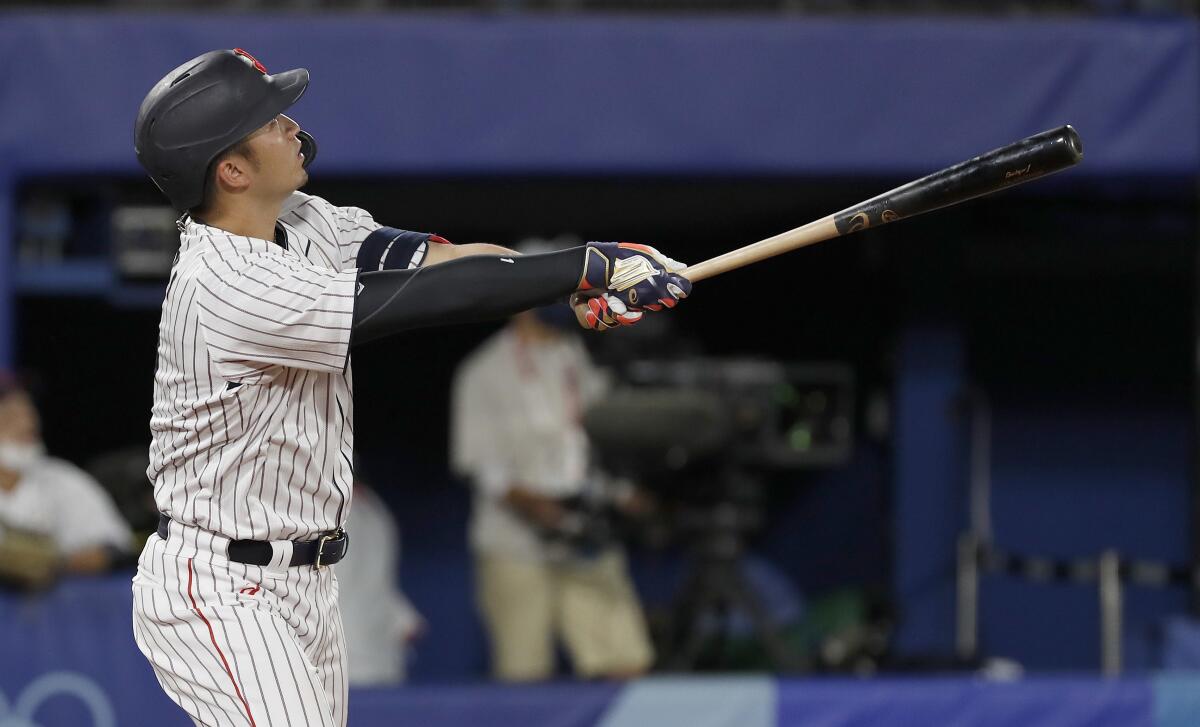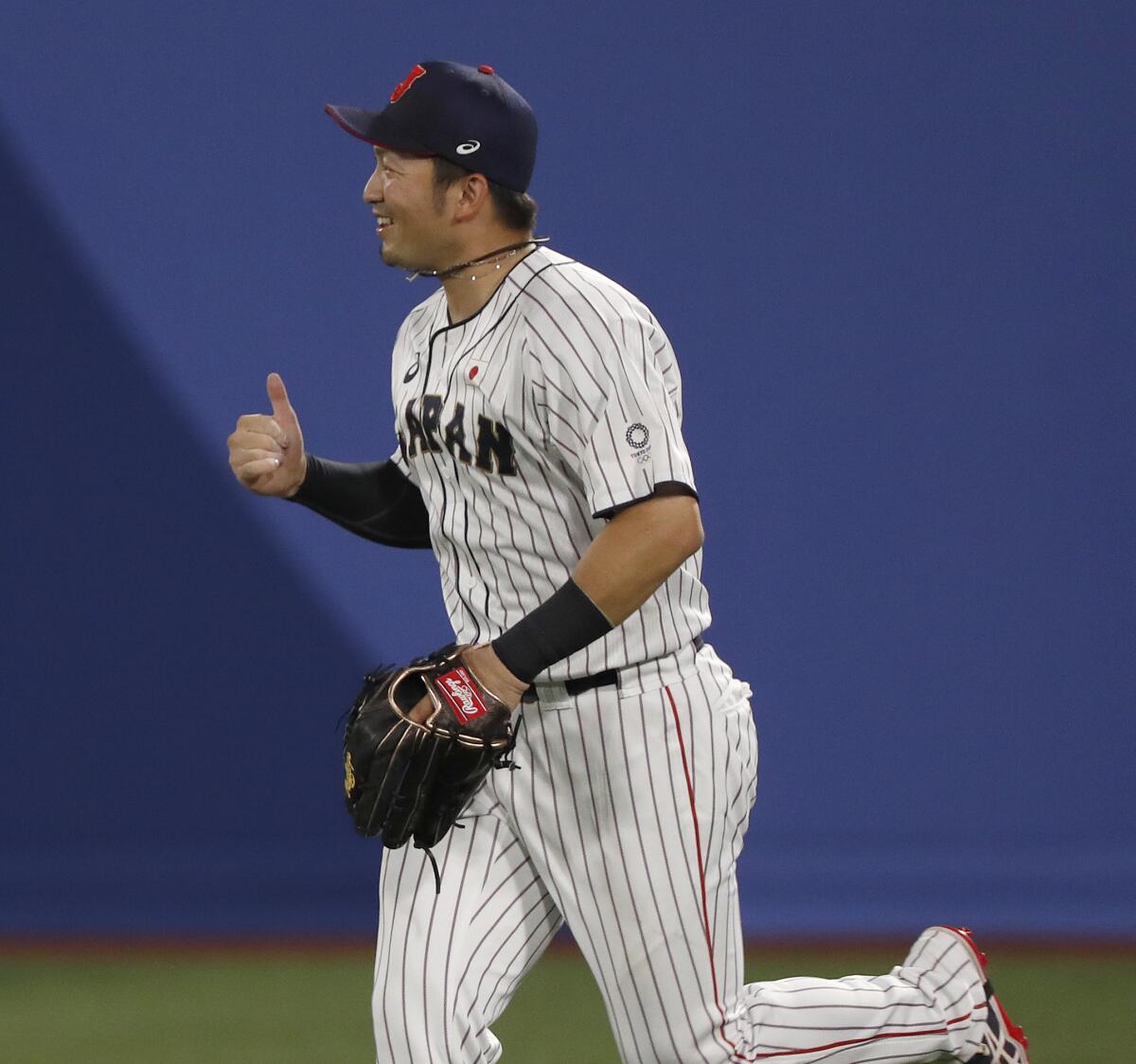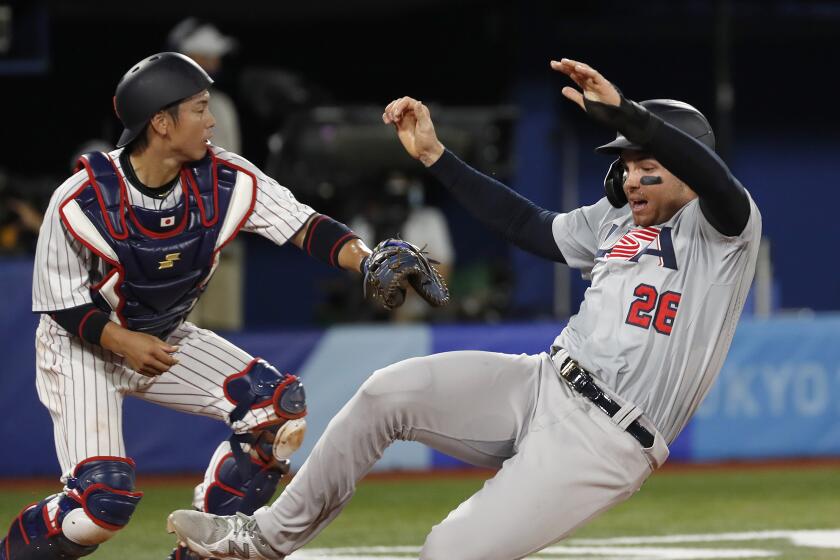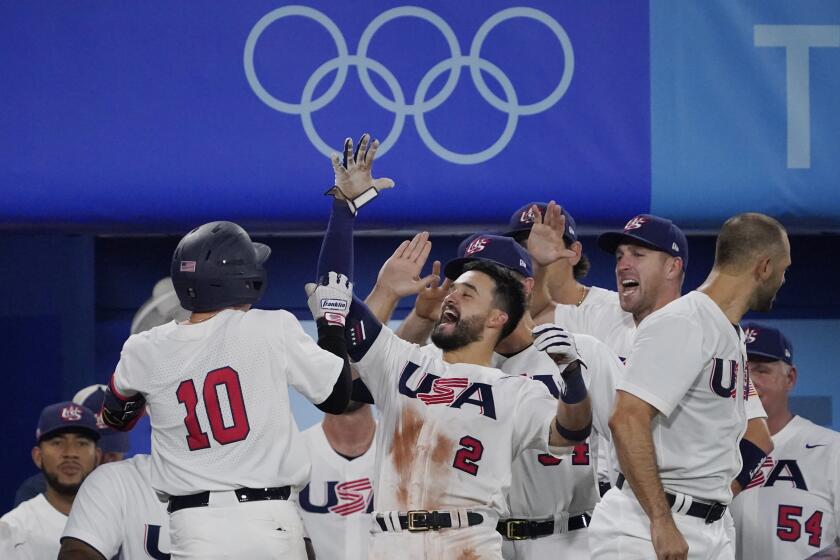Japanese baseball star Seiya Suzuki is MLB-ready, invites comparison to A.J. Pollock

- Share via
TOKYO — The baseball sailed over the left-field wall and every row of seats beyond it.
Seiya Suzuki’s home run in Japan’s 10-inning, 7-6 victory over the United States started close to here, about 25 miles northeast of Yokohama Stadium in Tokyo’s Arakawa ward.
There, in a room in his family residence that was converted into an indoor batting cage by his father, Suzuki embarked on a journey that made him Japan’s cleanup hitter at these Olympics — and is expected to one day make him his country’s next high-profile export to the major leagues.
With a 7-6 loss to Japan, the U.S. will next play an elimination game against the winner of Tuesday’s meeting between Israel and the Dominican Republic.
The story sounded familiar, a disciplinarian father training his son in the Arakawa’s Machiya neighborhood. That was also the plot of the early parts of “Kyojin No Hoshi,” or “The Star of the Giants,” a serialized comic in which the main character was a baseball player named Hyuma Hoshi.
Fifty years after its last episode aired, the animated version of “Kyojin No Hoshi” remains a touchstone of Japanese culture, so much so that pretty much anyone of any age can recognize its opening theme song after hearing the first few notes. In 2006, a variety show on TV Tokyo introduced Suzuki and his father to its audience as the “Hoshis of the Heisei era.”
Suzuki, then a fifth-grader, was shown hitting soft toss.
If Suzuki’s foundation was established by traditional Japanese training methods that emphasize repetition, his evolution into Nippon Professional Baseball’s most well-rounded player is something he credits to more modern methods that include weight training.

On both the Japanese national team and Hiroshima Carp, Seiya Suzuki wears the same No. 51 that was popularized by Ichiro Suzuki, but doesn’t share the beliefs of his childhood hero, who once argued against weight training by saying, “You can’t alter the balance with which you were born. Tigers and lions don’t lift weights.”
Seiya Suzuki has sculpted his nearly 6-foot frame into a 215-pound package of solid muscle.
“There are more players from Japan who are going to the majors, so we hear about these things,” Suzuki said in Japanese. “So our practice times are shorter, and we focus more on physical training.”
The 26-year-old is open about his dreams of one day becoming a player who sends word home about the latest trends in the major leagues.
“Of course,” Suzuki said. “I think everyone feels they want to play at the highest stage if they can get the chance.”
He should.
“He’s been the best player in Japan the last few years,” said a major league scout, who compared Suzuki to current Dodgers outfielder A.J. Pollock when Pollock was an All-Star with the Arizona Diamondbacks.
World Baseball Softball Confederation president Riccardo Fraccari is confident an upgraded form of baseball featuring international stars will be played during the L.A. Games.
Suzuki won a batting title two years ago when he batted .335. He’s smacked 25 or more homers in each of the last five years. He’s stolen as many as 25 bases in a season. He’s won four Gold Gloves. And he can throw, his fastball touching 92 mph when he pitched in high school.
“He’s a five-tool guy,” the same scout said.
Which is why it made sense when Suzuki revealed the major league player he admires most is Mike Trout.
Suzuki will be eligible for international free agency after the 2023 season, according to another major league scout, who is familiar with the details of his service time. But Suzuki is expected to move to the U.S. before that, because the small-market Carp could make several million dollars by making him available through the posting system.
Suzuki laughed when asked if he could move to the majors after this season.
“I wonder,” he said.
Glancing over at a Japanese reporter who was standing nearby, Suzuki asked, “Can I?”
The reporter also laughed.
“A Japanese reporter couldn’t ask a question like that, so direct,” the reporter said.
Suzuki laughed again.
He remained in good spirits, laughing yet again when asked if watching Shohei Ohtani obliterate major league pitching has given him confidence of doing well when he moves overseas.
“Not at all,” he said. “I’m the same age as Shohei. I think he’s incredible. He’s the first person my age who shocked me.”
Suzuki has done plenty himself, even if he hasn’t traveled to the other side of the world as Ohtani has. In the 25 miles or so between Arakawa and Yokohama Stadium, he went from neighborhood curiosity to a national hero. And in the relatively near future, the boy who was once called the future star of the Giants could instead become the star of a major league franchise.
More to Read
Go beyond the scoreboard
Get the latest on L.A.'s teams in the daily Sports Report newsletter.
You may occasionally receive promotional content from the Los Angeles Times.










